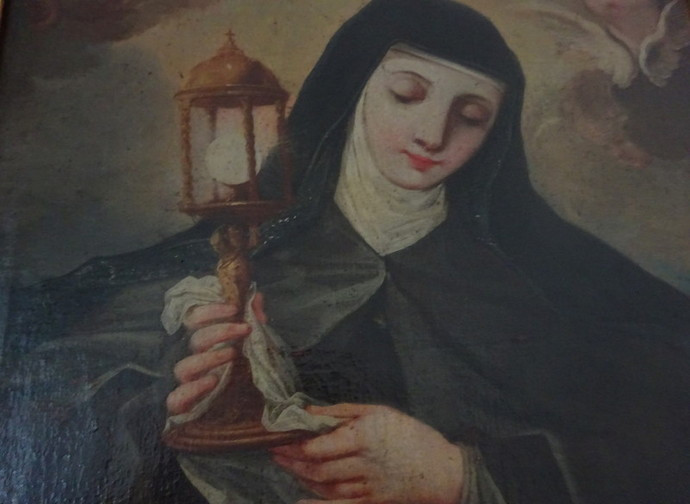Saint Clare of Assisi
Before following the example of St. Francis and continuing his work by founding the Poor Clares, a female branch of his order, Saint Clare of Assisi (c. 1193-1253) had been able to ask in prayer and meditate in her heart about what God was calling her to do.

Before following the example of St. Francis and continuing his work by founding the Poor Clares, a female branch of his order, Saint Clare of Assisi (c. 1193-1253) had been able to ask in prayer and meditate in her heart about what God was calling her to do. When the Poor Man had publicly stripped himself of his clothes to return them to his father, renouncing all earthly goods to follow Christ, Clare was only 12 years old.
Educated in the Christian virtues, she was a young woman of about 18 years of age when, on the night between Palm Sunday and Holy Monday in 1211 (or 1212), she fled from her father's comfortable home to the little church of the Portiuncula. Waiting for her was Francis, who cut her beautiful hair and clothed her in a rough habit, a sign of the beginning of a new life, consisting of penance and contemplation.
Many years later, at the beginning of her Testament, the saint wrote: “In the name of the Lord! Amen. Among the other gifts that we have received and do daily receive from our benefactor, the Father of Mercies, and for which we must express the deepest thanks to the glorious Father of Christ, there is our vocation, for which, all the more by way of its being more perfect and greater, do we owe the greatest thanks to him. Therefore the Apostle writes: Know your vocation”. And she had known and fully embraced her vocation, overcoming the initial resistance of her father and other family members. After Francis had entrusted her for a short time to the Benedictines, Clare settled into the small monastery attached to the church of San Damiano. She was joined by her sister Agnes (later followed by another sister, Beatrice, and her mother), together with other young women who wished to radically live humility and evangelical poverty: these were the beginnings of the Order of Poor Ladies or Damianite, who after the death of the foundress would be called Poor Clares.
It was Saint Francis (†1226) who transmitted the first simple rules of common life to Clare and her sisters, as the saint would remember decades later in the core of her Rule, the first written by a woman. “The blessed father, then, considering that we did not fear any poverty, toil, tribulation, humiliation and contempt for the world, that indeed we had it on account of great delight, moved by paternal affection, wrote the form of life for us in this way: Because by divine inspiration you have made yourselves daughters and servants of the Most High King, the heavenly Father and have espoused yourselves to the Holy Spirit, choosing to live a life according to the perfection of the holy Gospel, Resolve and promise for myself and for my brothers to always have that same loving care and solicitude for you as I have for them”.
Within the walls of San Damiano, Clare spent the last forty years of her earthly life, imitating Mary as the sure way to belong totally to Jesus. She therefore exhorted her sisters to entrust themselves to Our Lady. She well knew God’s works in history. This firm faith of hers, combined with her love for the Blessed Sacrament, obtained for the city of Assisi the liberation from enemy troops, and for her monastery the removal of the Saracen threat. In the famous episode in which Clare, rising from her sick-bed, had the monstrance brought with the Eucharist; blinding the invaders with a very strong light and forcing them to flee. “I will always guard you!”, she had heard Jesus say shortly before, after begging him to protect her nuns.
Wishing to conform herself to Our Lord, she was filled with tenderness and awe in meditating on the mysteries of the Incarnation and His holy Passion. She wished to strip herself of every worldly thing or desire that could keep her away from Him. Always maintaining filial obedience to the Church, she tenaciously demanded and defended the privilege of poverty (“That is, by not receiving or having possession or ownership either of themselves or through an intermediary, […] Except as much land as necessity requires”), which she succeeded in inserting into the Rule. This received pontifical confirmation two days before Clare's death, with the Bull Solet Annuere of Innocent IV (9 August 1253). The pope had been to visit her shortly before in San Damiano and, at the saint's request to forgive her sins, he had told her: “My daughter, would to heaven that I need forgiveness as little as you do!”
The saint, who called herself “unworthy handmaid of Christ and servant of Poor Women”, returned to the Father on 11 August after a long illness. In her last moments she said: “Blessed be Thou, O Lord, who created me!”.
Patroness of: television, telecommunications
Learn more:
